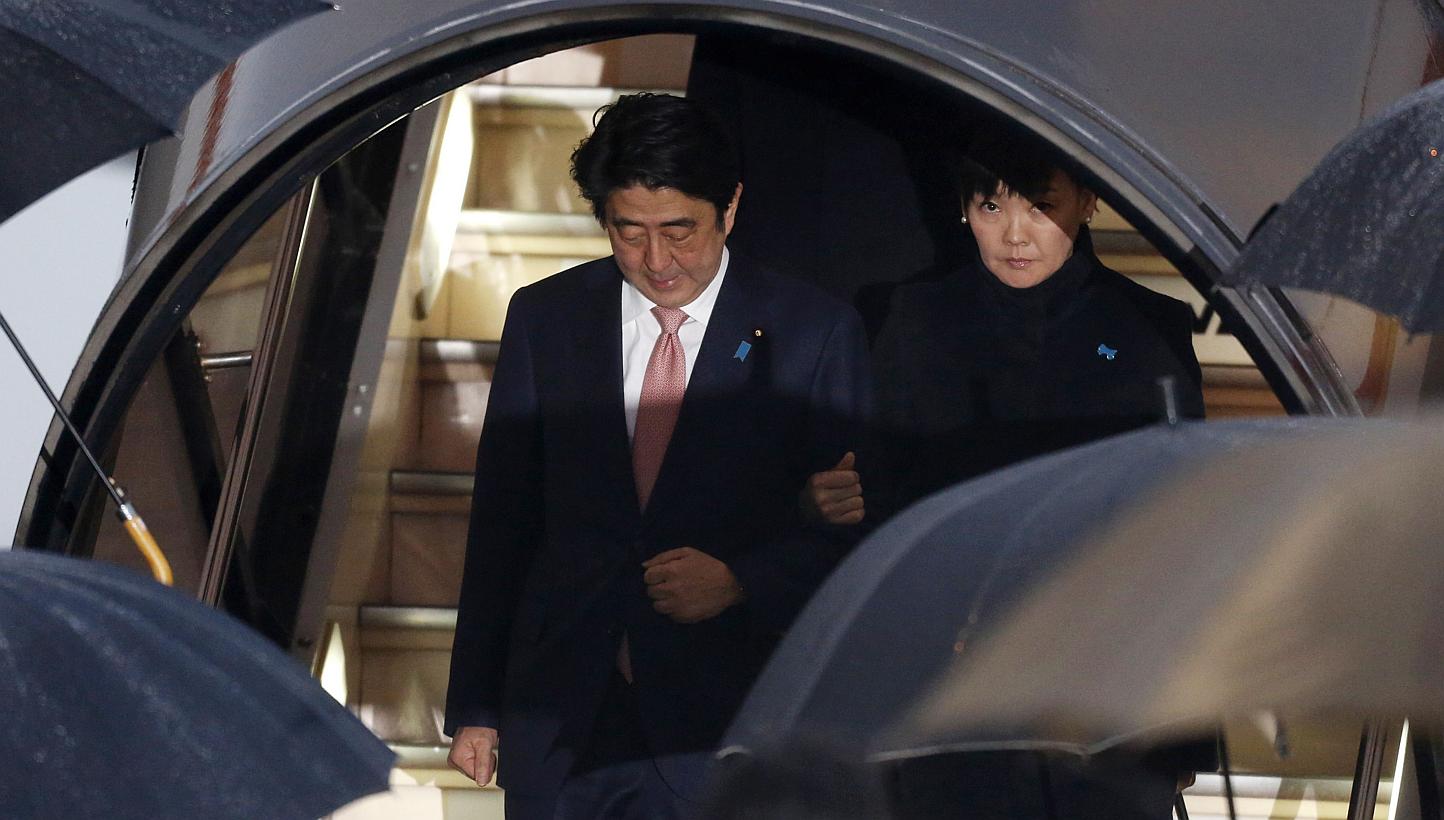'Race against time' to save ISIS hostages: Japan PM Abe
Sign up now: Get insights on Asia's fast-moving developments

Japan's Prime Minister Shinzo Abe (left) and his wife Akie disembark from a plane as they arrive at Haneda airport in Tokyo on Jan 21, 2015. Mr Abe said on Wednesday the government was in a "race against time" to save two Japanese nationals held hostage by ISIS. -- PHOTO: REUTERS
TOKYO (AFP, Reuters) - Japanese Prime Minister Shinzo Abe admitted on Wednesday the country was in a "race against time" to save two Japanese nationals held hostage by the Islamic State in Iraq and Syria (ISIS), shortly after he arrived home from the Middle East to take charge of Tokyo's response to the crisis.
In an online video released on Tuesday, ISIS militants threatened to kill two Japanese nationals unless Abe pays a US$200 million (S$250 million) ransom by Friday.
Abe admitted it was a "race against time" to free the two hostages. "This is a very tough race against time, but the government will do its utmost," he told reporters in Tokyo.
"I have ordered the government to use all diplomatic channels and routes possible... to ensure the release of the two people."
But he remained defiant and said he would not bow to "terrorism". "Japan will never yield to terrorism. Japan will do its best in the battle against the cowardice of terrorism, hand in hand with the international community," Abe said.
Japan has been thrust centre-stage in the conflict gripping Syria and Iraq, where extremists have seized control of large areas, by the hostage situation.
Abe, who rushed home from a tour of the Middle East, said he had sought help from Palestinian leader Mahmud Abbas, as well as from Egyptian President Abdel Fattah al-Sisi, Jordan's King Abdullah and Turkish President Recep Tayyip Erdogan.
Speaking while on a visit to London, Japan's Foreign Minister Fumio Kishida described the hostage situation - and the attack on the French satirical magazine Charlie Hebdo - as "deplorable acts of terrorism". Japan has been "greatly contributing to world peace, stability and prosperity, and our path will remain the same as a peace-loving nation", he added.
The self-styled Islamic State group has murdered five Western hostages since August last year, but this is the first time it has threatened Japanese captives. In footage posted on extremist websites Tuesday, a black-clad militant brandishing a knife addresses the camera in English, standing between two hostages wearing orange jumpsuits identified as journalist Kenji Goto and military contractor Haruna Yukawa.
"You now have 72 hours to pressure your government into making a wise decision by paying the US$200 million to save the lives of your citizens," he says. Tokyo said Wednesday it believed the deadline would expire at 2.50pm (1.50pm Singapore time) on Friday. The militant says the sum is equal to the aid that Abe pledged in support of the fight against ISIS extremists, money
Japan says is to help refugees fleeing the fighting in Iraq and Syria.
Japan says is to help refugees fleeing the fighting in Iraq and Syria.
Media pored over the video Wednesday, with much discussion of its authenticity, amid suggestions it may have been confected from at least two sources. Commentators seized on apparent discrepancies in the way shadows fell, the movement of the two men's clothes and the fact that neither appears to flinch as their captor waves a big knife near their heads.
Chief Cabinet Secretary Yoshihide Suga said experts had examined the footage. He did not address the speculation, but said the Japanese government was assured of the identity of the men.
It emerged Wednesday that Goto, a freelance broadcast journalist whose work has appeared on major Japanese outlets told an acquaintance in Turkey that he had been sold out by a fixer. "I was betrayed by a guide who accompanied me to Syria and I was captured by a military group," Goto told the acquaintance, the Mainichi Shimbun reported, citing unnamed government sources.
A few days later, Goto's family in Tokyo received an email from a self-proclaimed ISIS member demanding some 2 billion yen (S$22.7 million) ransom money, the paper added.
Hiromasa Nakai, chief spokesman for the Japan Committee for the United Nations Children's Fund (UNICEF), insisted Goto was a peace-loving man. He "has been working hard for children in the Islamic world - not only in Syria but also in Afghanistan, Somalia and many other places," he told AFP. "It's an extreme shock to us. We hope he will return safe."
National broadcaster NHK said it had spoken to someone claiming to be in charge of "public relations" for the militant group. "We don't need money," they quoted the person as saying. "Islamic State is spending more than (US$200m) in one day. It's not an economic war but a spiritual war," the person said, repeatedly adding the group was confident "your government will pay the money".
The release of a video on the day Abe was in Jerusalem and due to give a major press conference is a grim reminder of the well-oiled PR machine of the IS group. It follows a pattern established last year with the killings of US journalists James Foley and Steven Sotloff, American aid worker Peter Kassig and British aid workers Alan Henning and David Haines. All were beheaded.
The man who appeared in the video threatening the Japanese hostages spoke with a very similar southern English accent to the militant who appeared in the footage posted of the executions of the Britons and Americans.

